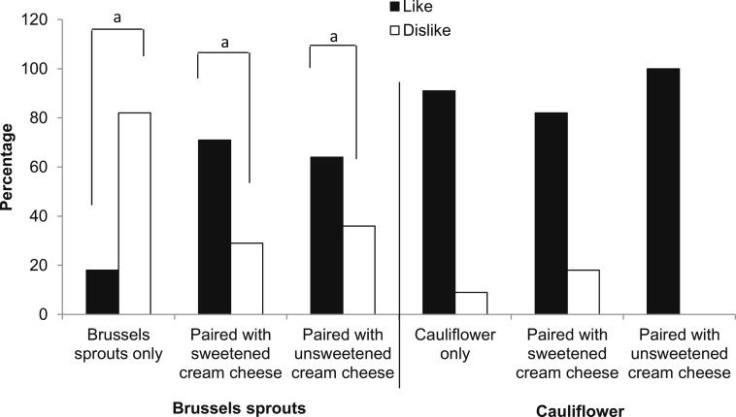Getting Kids To Eat Vegetables: Try Pairing Foods, Like Brussels Sprouts And Cream Cheese

A new study shows that parents may teach children to eat healthy by pairing fruits and vegetables with more savory foods in a “good cop, bad cop” round of associative conditioning.
Though most kids might raid a fruit bowl for afternoon sustenance, few hunger for an afternoon snack of plain vegetables, particularly the bitter taste of brussels sprouts. But by pairing the leafy green cultivar with a schmear of cream cheese, a child’s palate may be so refined. "This has the potential to change the eating habits of children, including eating more vegetables, and this in turn will affect childhood obesity," Elizabeth Capaldi-Phillips, a psychologist at the University of Arizona, told Reuters.

The researchers found that children developed an affinity for sweeter vegetables such as cauliflower with simple exposure, while “associative learning was more effective than exposure in increasing liking for a novel, bitter vegetable — brussels sprouts.”
In the study, parents of 29 children ages three to five answered a survey about their children’s dietary history and preferences. Based on those answers, Capaldi-Phillips and her colleagues chose cauliflower and brussels sprouts as two novel foods rarely appearing on the dinner table, making for a good comparison. Once daily for a week, the children were given either cauliflower or brussels sprouts, eating in a group of five to six led by a researcher or teacher. The vegetables were served boiled with either sweetened or unsweetened cream cheese.
Aftward, the researchers tested the influence of that conditioning by offering the children plain vegetables served with no cream cheese. Though fewer than 20 percent of children in the study had liked brussels sprouts without cream cheese, 72 percent of kids who had been primed by the food pairing now said they liked the bitter vegetable — even without cream cheese.
With food pairing, children also required fewer exposures — about seven — to develop a taste for new foods, than suggested by past research, according to investigator Devina Wadhera, who helped with the study. "Children develop food preferences at a young age, yet tend to be really picky at this age, so it's important to sustain healthy habits which will persist into adulthood," she told Reuters. "It's our job as parents, as educators to get them to accept new foods at this time," she said.
However, the researchers tempered their conclusions, saying future study might involve longer-term follow-ups with study participants to ascertain whether or not the taste changes would influence long-term dietary habits.
Source: Capaldi-Phillips, Wadhera, Devina. Associative Conditioning Can Increase Liking for and Consumption of Brussels Sprouts in Children Aged 3 to 5 Years. Journal of the Academy of Nutrition and Dietetics. 2014.



























